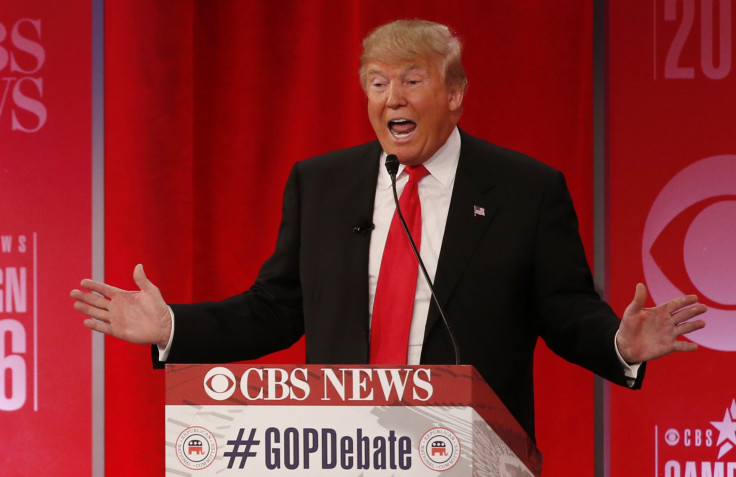Who Won The CBS Republican Presidential Debate? Cruz, Rubio, Kasich, Bush Have Strong Outings As Trump Booed

Texas Sen. Ted Cruz may have scored the most political points Saturday night, as he systematically launched heated attacks against all of his competitors on the South Carolina debate stage, critcizing their stances on national security, health care and immigration.
Cruz enjoyed what appeared to be a disproportionate amount of time to speak while largely remaining calm as he came under fire from his rivals. However, the incessant bickering among the other candidates may have turned off a lot of undecided voters, a top GOP pollster speculated.
Seriously, this is insane.
— Frank Luntz (@FrankLuntz) February 14, 2016
The GOP is destroying itself tonight, and they have no one to blame but themselves. #GOPDebate
On healthcare, Cruz said that Obamacare costs young people their jobs, or at least reduces their hours. "While I was standing with [Alabama Sen.] Jeff Sessions, Rubio was writing Obamacare," Cruz said, accusing Rubio of apparently approving of President Barack Obama's Affordable Care Act, which is anathema to Republicans. Cruz also got into it with billionaire business mogul Trump over Planned Parenthood; Trump retorted that Cruz has used dishonest campaign tactics.
But Cruz more than held his own while Trump amplified his voice in apparent frustration.
"You are the single biggest liar." -- @RealDonaldTrump responds to @TedCruz's accusations: https://t.co/itOIWpS4r2https://t.co/ba9AnG7cmW
— CBS This Morning (@CBSThisMorning) February 14, 2016
Earlier, the candidates paid homage to U.S. Supreme Court Associate Justice Antonin Scalia, a conservative who died earlier in the day. The candidates were asked whether Obama should be allowed to replace the judge, and Cruz pounced on Trump, asserting that Trump would appoint a liberal to the nation's highest court.
The candidates largely agreed that replacing Scalia should wait until a new president is elected, although Trump and former Florida Gov. Jeb Bush noted that Obama was likely to exercise his Constitutional right to name a nominee and that it was up to the GOP-led Senate to block him.
Ohio Gov. John Kasich, meanwhile, defended the expansion of Obamacare. He continued to portray himself as a peacemaker and stayed out of the crossfire. Kasich placed second in last week's New Hampshire primary and came into the debate with apparent momentum after having been all but counted out prior to the Granite State contest.
We are all John Kasich #GOPDebate https://t.co/uTChEXIyFz
— Mashable News (@MashableNews) February 14, 2016
When it came to national security, Florida Sen. Marco Rubio and Cruz squared off in a contentious exchange over immigration, ending with Rubio charging that Cruz doesn't speak Spanish, an apparent jab at the Texas senator who has touted his Hispanic heritage on the campaign trail. Cruz responded to the charge in Spanish.
ICYMI: @MarcoRubio and @TedCruz spar over the issue of illegal immigration at #GOPDebate. https://t.co/uXuyXQTf9g https://t.co/8IbDEEgrQl
— CBS Evening News (@CBSEveningNews) February 14, 2016
Rubio scored some points against Trump, as well, when he said he thanked God "that George W. Bush was in the White House at the time of Sept. 11 and not Al Gore" in response to Trump's pointing out that the 2001 terror attacks occurred on President Bush's watch.
Jeb Bush got in on that argument, attempting to shame Trump for invoking the names of his family members in what the former Florida governor called personal attacks. (In a backhanded compliment, Trump said it would be better if Barbara Bush were running.) Before that, though, the two disagreed over the strategy to fight the Islamic State group, with Trump saying that beating the jihadists was a higher priority than ousting Syrian President Bashar Assad.
Things heat up between @realDonaldTrump and @JebBush during #GOPDebate pic.twitter.com/4ekfKHUwPy
— BuzzFeed News (@BuzzFeedNews) February 14, 2016
Billionaire businessman Trump, whose comments were frequently booed by the audience, may have been the debate's biggest loser. He was criticized for using profanity and pledged to refrain from here on. Some South Carolina voters have told reporters that they are disturbed by his vulgar language and the state has a high proportion of evangelical Christians.
Bush performed better than in the party's earlier debates, he may not be able to pull ahead of his rivals at this point.
Ben Carson was largely absent from most of the night's conversations and apparently incorrectly cited Joseph Stalin while he was relegated to a relative afterthought as the attention coalesced around Cruz, Rubio, Kasich and Bush.
Ben Carson cites a fake Stalin quote: https://t.co/jxsxrs5T59 pic.twitter.com/sW1letXzp4
— Mashable News (@MashableNews) February 14, 2016
The candidates entered Saturday night's presidential debate in Greenville, South Carolina, with two fewer Republican White House hopefuls after New Jersey Gov. Chris Christie and former Hewlett-Packard CEO Carly Fiorina each dropped out of the race Wednesday. Neither secured enough support following Tuesday's New Hampshire Republican primary, which were likely a major factor in the suspensions of each of their campaigns.
Trump remained in the lead in South Carolina prior to the debate with more than 36 percent polling, followed by Cruz with 25.3 percent, Rubio with 14 percent, Bush with 10.9 percent, Kasich with 8.7 percent and Carson with 4.7 percent.
Despite his consistently high polling, Trump failed to win the Iowa caucuses earlier this month. Cruz won in that contest before Trump rallied a week later to win the New Hampshire primary.
© Copyright IBTimes 2024. All rights reserved.












